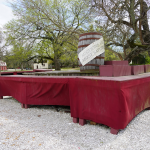Article by Peter Koeppel, member of Trinity Memorial Church in Binghamton. Koeppel serves on the diocesan Stewardship Resources team and the diocesan Creation Care Initiative and is a frequent contributor on the topics of creation care, stewardship, and racial justice and reconciliation.
We were sitting in Trinity Memorial’s Flower Room, when the heating system in our church started clanking like it was ready to burst—quite impressive really, but not what we want to hear from our heating system.
The noise got us into talking: what might be causing it, what to do about it, and from there our conversation meandered into what we, in our families and homes, or businesses might do to lessen our carbon-impact. The first operative word here is “do.” “Do not” is no longer an option.
We talked about heat pumps as heating systems (we’re already familiar with the way they work in the form of air conditioners); we talked about moving to green electricity; and we talked about moving to electric vehicles. My friend raised the usual questions: How do I know that the life-cycle footprint of solar panels or wind turbines is as good as we need it to be? How do I know that the life-cycle carbon footprint of an electric car is as close to zero as we need it to be? The answer is clearly: I don’t. But here’s the thing: if I let my lack of knowledge of the end-to-end, life-cycle carbon foot-print of everything I might do influence what and when I do it, it will be a long time before I do anything. And “do not” is no longer an option.
Rather, by doing something, we’re sending signals to the other players—energy providers, among many others—that we’re moving towards a green, electric future, and we expect them to be there with us. By doing something, we’re sending signals to manufacturers that we care about what they do and how they go about it. By doing something, we’re sending signals to our friends and neighbors that it’s ok to care for God’s creation. If those signals are not enough, then we have the opportunity to shape public policy, even laws, through public advocacy.
Not everyone is called to be a public advocate—but all of us are called to actively participate in the immediate realm for which we are responsible and accountable to ourselves, to each other, and to our Creator: our home, our personal transportation, our business management, etc. Wouldn’t it be a nice pace of change to compete with our neighbor not over who has the most or baddest toys, but who has the greenest toys? Or the most colorful lawn and garden? And we really should thank those who are working with public policy makers to address care for God’s creation in the environmental, social and legal conditions in which we all live and work. They’re doing double duty.
If all that sounds a bit reminiscent of 1 Corinthians 12:28, it should—God doesn’t call on every one of us to individually do everything to restore His creation, just as he doesn’t call on us as members of His church to be or do everything in the Church. God does call on everyone of us to do what we have been given to do, including sound stewardship of the earth’s assets; analysis paralysis is definitely not on the list of gifts he calls on us to exercise. We are to take action the best we can.*
*See also: Matthew 25:14-30, Luke 19:12-27


